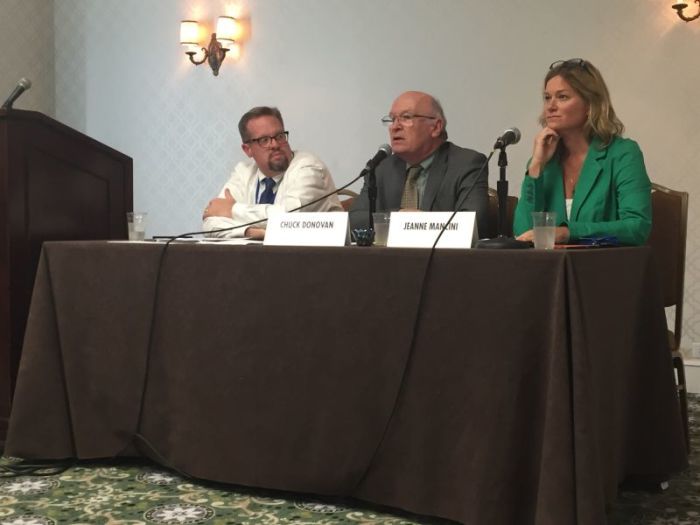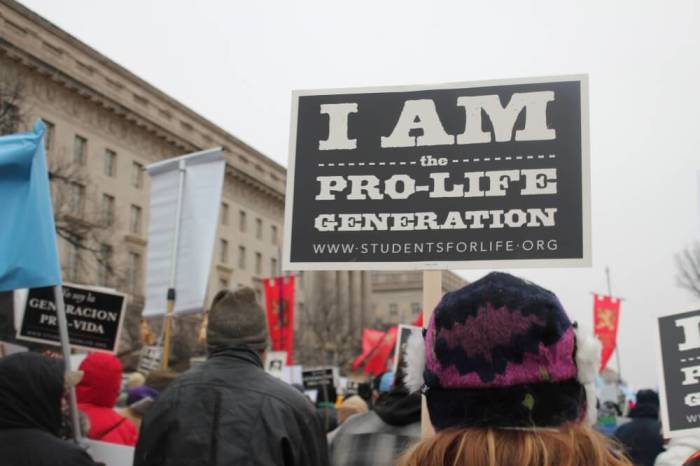What Can Religious Liberty Movement Learn From Success of Pro-Lifers?

WASHINGTON — As conservative Christians continue to push for religious freedom protections in the wake of the 2015 U.S. Supreme Court decision that legalized same-sex marriage, there might be lessons religious freedom advocates can take away from the successes of the pro-life movement.
Two pro-life leaders and a religious liberty scholar participated in a panel discussion on Saturday titled "What the Religious Liberty Movement Can Learn From the Victories of the Pro-Life Movement" at the Family Research Council's Values Voters Summit.
"It is interesting to come to an event were the successes of the pro-life movement are considered an exemplar or template for how everyone else operates," Chuck Donovan, president of the Charlotte Lozier Institute, the research arm of the pro-life lobbying group Susan B. Anthony List, said.
"If you are in the pro-life movement, you know that we have gone nearly half a century since Roe v. Wade and ... have a pretty strong estimate that there are about 60 million American lives who are not here because of that decision. I don't sit in any triumphal role saying that I or anyone else has a roadmap to the future."
Although the pro-life movement has engaged in a seemingly uphill battle to protect the lives of the unborn and the conscience protections of Americans since the Supreme Court legalized elective abortion in 1973, the pro-life movement has experienced quite a few victories in the last nine months since President Donald Trump entered the Oval Office.
"This is where I think the pro-life success matters. Susan B. Anthony List has remarkable success politically lately — underscore lately. It hasn't always been that way. Five years ago, it didn't look so good," Donovan, who previously served in executive and policy roles with FRC for two decades, said.
Donovan assured that the most recent successes of the pro-life movement as seen in the Trump administration are a result of the fact that pro-life groups like the SBA List have made a concerted efforts in the last few years to go door-to-door to gain grassroots support.
"But what [SBA List] did do is something it learned from President [Barack] Obama's first campaign and repeated in his second. That is go out and meet people, go door-to-door," Donovan added. "Already, Susan B. Anthony List has knocked on 100,000 doors in six states and we are not even in the election year yet. They are learning so much."
Hunter Baker, a professor of political science at the evangelical Union University in Kentucky, warned that the gay marriage decision in Obergefell v. Hodges has the potential to threaten the religious liberties of Christian business owners and Christian institutions that act in accordance with the biblical definition of marriage.
"The religious liberty implications are truly massive," he asserted.
Baker explained that it wouldn't take much for Christian colleges and other religious institutions that uphold a one man one woman definition of marriage to face existential danger.
"Simple fact is that with a Department of Education with the right mindset, it would not require an act of Congress to put [Christian colleges] out of business," Baker stressed. "What you could have is a regulatory action to say that an institution with the beliefs [on marriage and sexuality] that we hold ... cannot receive any federal loans for our students, any Pell grants for poor students, any veterans benefits, any of that stuff. That would effectively put us out of business and almost any institution in the land is in the same situation."
Baker added that Christian colleges that act in accordance with traditional definitions of marriage could face intimidation and coercion tactics by accreditation agencies. Other religious freedom advocates have voiced concerns that Christian colleges could be at risk of losing their tax-exempt statuses for acting in accordance with its traditional beliefs on marriage and sexulaity.
Considering that there is heated ongoing political debate about whether or not religious institutions, individuals and businesses should be given religious freedom and conscience exemptions from discrimination laws protecting on the basis of sexual orientation, Donovan explained that efforts to provide conscience protections to objectors following the Roe v. Wade abortion decision in 1973 were bipartisan.
Donovan pointed to the Church Amendment, which provided conscience protections to individuals and entities that objected to performing of assisting in the performance of abortions. That amendment was introduced by Democratic Utah Sen. Frank Church. However, Donovan noted that there is no consensus for conscience protections today following the Obergefell ruling.
"There was no question in the Senate of the United States [following Roe v. Wade] of enacting this uncontroversial amendment. Of course, we weren't going to make medical institutions and religious people or people who were just on the street that didn't want to pay for an abortion," Donovan said. "[T]here was immediate consensus after Roe. We don't have that now."
Donovan observed that there is a tendency today for many to act as if they are in a "defensive crouch" when speaking on the issue of religious liberty in the context of gay marriage.
"It is not a defensive crouch anymore than the First Amendment is a defensive crouch. These are liberties that are meant to be used and they are to be used responsibly to persuade and to move other people," Donovan said. "First thing about winning a religious liberty fight is not to be in a defensive crouch, we need to be out debating and discussing."
Patrina Mosely, the panel moderator and deputy director of FRC Action, told the audience that people who support religious freedom and conscience protections are not making themselves as identifiable as pro-lifers have.

"[At the March for Life] every year, we've seen hundreds of signs that say, 'We Are the Pro-Life Generation,' 'Pro-Life Students,'" Mosley said. "But with this subject of religious freedom, it's kind of 'Well, you know, I feel it personally.' But I don't see any champions saying, 'I am for religious freedom, 'I am for the right of conscience out in the street.'"
Jeanne Mancini, the president of March for Life, told the audience that having success in the pro-life movement required a "change of heart and mind" before laws could be changed or enacted. Like Donovan, Mancini stressed the importance of grassroots efforts.
"The grassroots work is critical. It is critical for legislation but it's also critical for changing hearts and minds," she said. "That's really the essence of the March for Life — activating the grassroots. The most important thing is that the tens of thousands of people who come to D.C. every year is for us to change their hearts so that they go home and are fully activating their potential to the community. Really, we are not going to build a culture of life unless all of us take it seriously and see it is our personal responsibility."
As far as the religious liberty movement goes, Mancini stressed the importance of making sure that sacrifices are made and voices are heard every time something negative happens.
Mancini explained that March for Life was established in response to the "unconstitutional" ruling in Roe v. Wade, and explained that founder Nellie Gray sacrificed by quitting her job as a government lawyer to establish the March for Life.
"I think that when religious liberties or conscience protections are challenged, it's also important that we make sacrifices, serious sacrifices," Mancini contended. "There are so many things that people can do at the local community level. Things as simple as running for a school board or elected position to have influence, hosting a small group to educate people about these issues, hosting a fundraiser for an organization that helps with these kinds of things, giving money to organizations that help, writing an op-ed, praying."




























